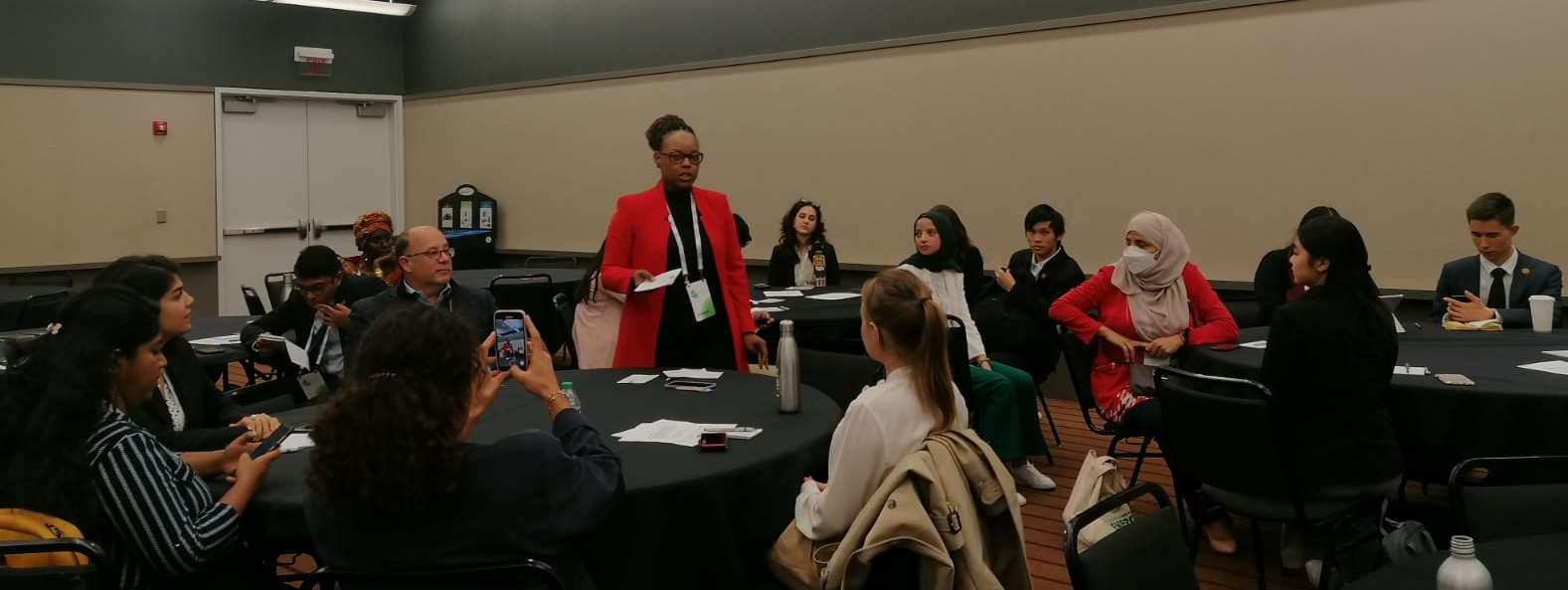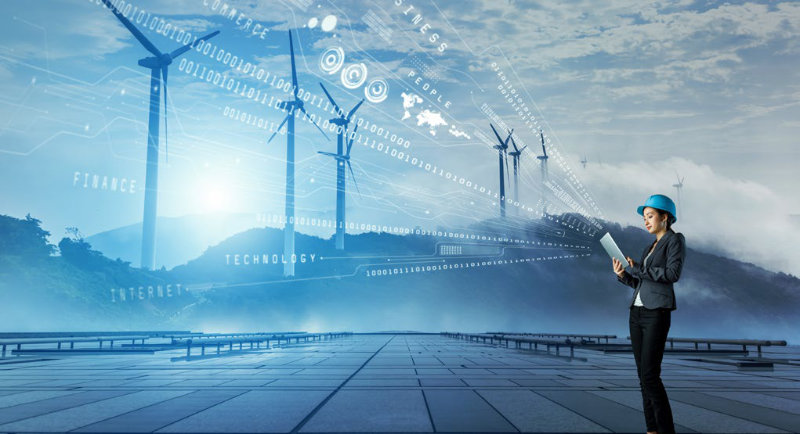
The ideas and talents of all members of society are essential to building a sustainable future. Closing the gender gap and increasing women’s participation and leadership in the field of energy are prerequisites to meeting our shared clean energy challenges.
The Clean Energy Education & Empowerment (CE) Technology Collaboration Programme (TCP) has been working towards this goal in the framework of the International Energy Agency (IEA) and the Clean Energy Ministerial. The Workshop’s goal was to present the CE TCP and other international initiatives as well as Austrian good practices, which aim to promote gender equality in energy companies and organisations. About participants took the opportunity to learn from good practices and to network with role models.
Andreas Wildberger from the Austrian Research Promotion Agency and Sabine Mitter from the Federal Ministry for Transport, Innovation and Technology welcomed participants to the workshop. In their addresses of welcome, they underlined the importance of women for innovation and success in advancing the clean energy agenda.
Introduction and Keynotes
Annette Hollas, Chairwoman of the CE TCP, first introduced the goals and activities of the CE initiative. Launched in , the initiative has since grown to include more than ambassadors from countries. In , the initiative became part of the International Energy Agency’s Technology Collaboration Programme. Apart from providing information about the initiative, Ms. Hollas also pointed out that closing the gender employment gap by would create million jobs for women. Thus, advancing women’s equality could add trillion USD to global GDP.
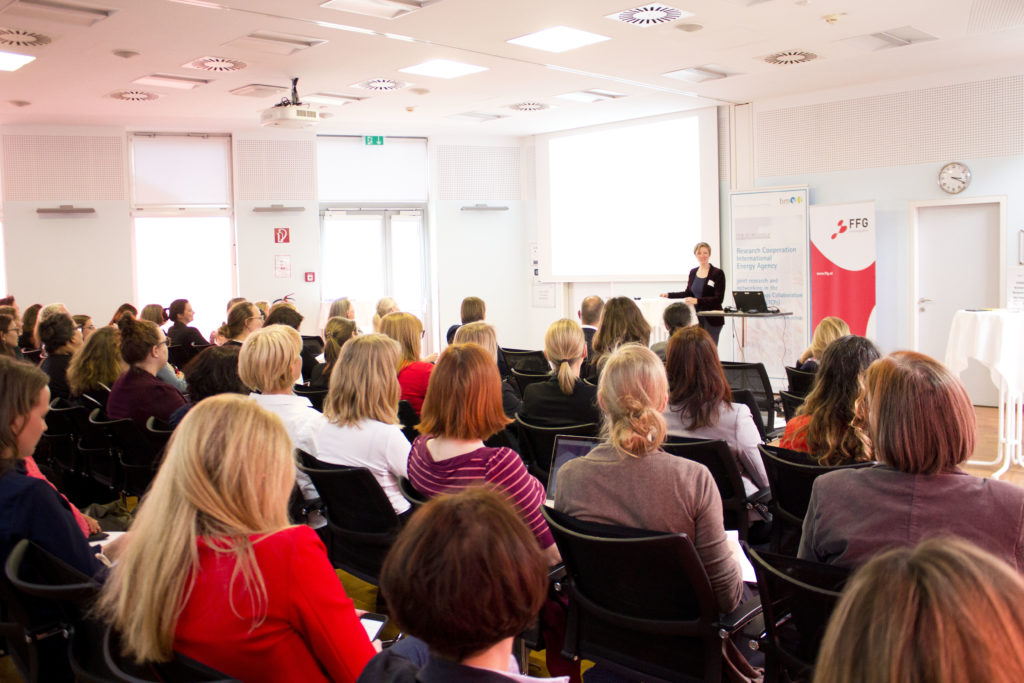
In the second keynote Heike Mensi-Klarbach, professor at the Vienna University of Economics and Business Administration, explained how gender diversity is relevant. In times of increasing global complexities, companies need to be adaptable and agile to have success. This is also true for companies in the area of energy. The more organizations are self-organized and decentralized, the more they are open to change and the more they become innovative. Ms. Mensi-Klarbach then introduced the notion of “enabling leadership” to denote leaders, who foster such change and innovation. Enabling leadership in her view combines conviction and humility, the inclination for learning as well as the awareness that the whole is bigger than its parts. In her view, women are not per se better at being enabling leaders, but qualities often thought of as “female”
are necessary for fulfilling such a role.
Short Interviews – Strategic Thoughts on the Inclusion of Women
Experts from six different companies, organisations and initiatives briefly explained their own specific thoughts on the inclusion of women in energy companies.
Gudrun Senk, Wien Energie GmbH
At Wien Energie women hold % of nd level of management positions. Women are especially encouraged to apply. In order for women to succeed, it is important to know the “traditional male behaviour of leading”. Since, as Mrs. Senk put it, you need to know the rules in order to win the game.
Christine Lins, Global Women’s Network for the Energy Transition
Together with three other women, Christine Lins founded GWNET. The initiative proves that there are more than enough female experts in the area of energy. This is especially true for expert conferences. In Mrs. Lins’ opinion, there is no justification for a “manel” (i.e. solely male panel). At first, she did not consider herself as a role model, but realized that encouragement and visibility is key for fostering women in the field.
Andrea Grabher, WIMEN Network
The network was founded against the backdrop of male dominated conferences (#manels) in energy and environment. The idea was to create spaces for women and to advance their visibility. The network strives for interdisciplinarity and sustainable development.
Roman Schmid, BIOENERGY + GmbH
Bioenergy + is a research centre for clean energy and various bio energy technologies. The company took part in the FEMtech Career programme by the Austrian Research Promotion Agency. The aim was to improve the situation for women in the company and increase the share of women in the workforce (Gendergizing & FeMentoring). Mr. Schmid added that there is not enough female talent from technical universities available.
Margaretha Spencer, AEE – Institute for Sustainable Technologies
Margaretha Spencer from the AEE concurred with Mr. Schmid that there are not enough female students in STEM fields. However, the situation is changing: for junior positions – there are already around % of women applicants but for senior positions there are still too few qualified candidates. AEE has hosted FEMtech Internships for Female Students in the last years and several of the candidates have stayed in the company and are advancing successfully.
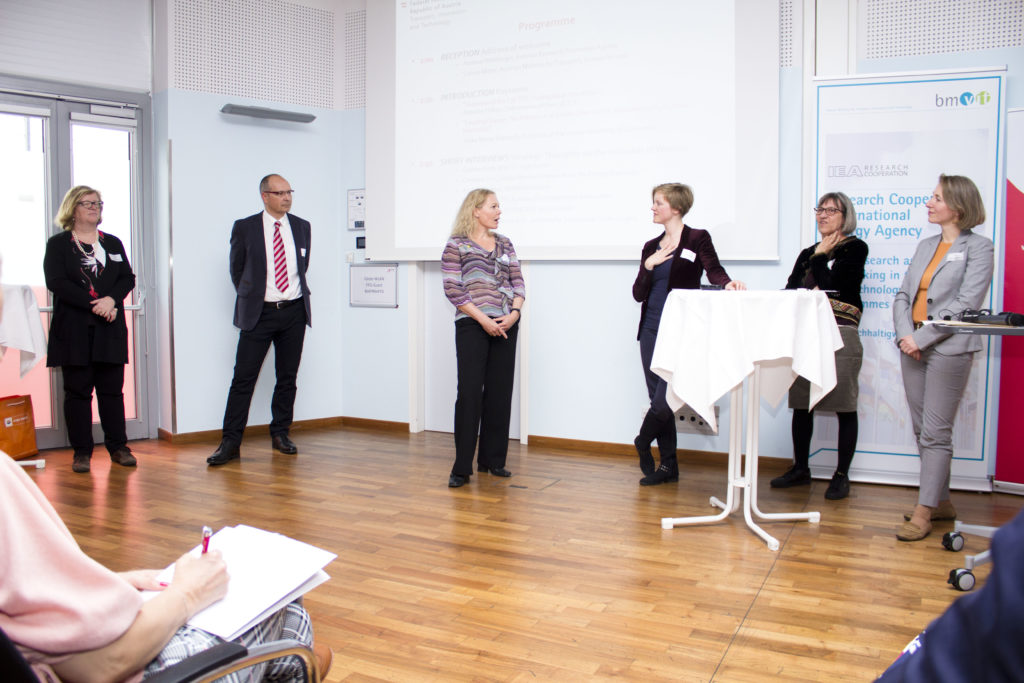
Margaretha Spencer (AEE – Institut für Nachhaltige Technologien), Astrid Reinprecht (ÖGUT), Andrea Grabher (WIMEN Network),
Gudrun Senk (Wien Energie GmbH) © Petra Blauensteiner/ÖGUT
In the ensuing debate, the experts found that the situation for women is improving. More windows of opportunity develop thanks to substantial changes in the energy sector (new and more diverse technologies). These changes suit different wishes and career prospects, which proves to be especially attractive for women. Skills are diversifying, skills like networking and enabling leadership are becoming more and more relevant – this particularly relates to women. In addition, the topic of sustainability as such is attractive for women.
With respect to the topic of female participation at conferences, the discussants held that it is important to enter male dominated fields and conferences. If gender were only discussed among women, women would not succeed. Christine Lins added a concrete example: In , she came on board to assist the Mexican government in organizing the KPMG Mexico Energy Conference. Eventually, they raised the share of women speakers to %.
Market Place of Possibilities – Meeting Role Models & Good Practices
The Market Place of Possibilities was an informal networking opportunity to exchange in-depth with the organizations and initiatives briefly presented in the session before.
Global Women’s Network for Energy Transition – GWNET (represented by Christine Lins)
- Women need to apply for jobs even if they don’t fulfil % of the job profiles
- Women should be confident about gaps in their CVs, nobody is an expert in everything, they will learn on the job
- GWNET would like to establish regional connections all over Austria with similar initiatives
- GWNET is looking for partners for the Women in Energy Expert Platform and would be interested in cooperation with FEMtech
OVE Austrian Electrotechnical Association // fem OVE (represented by Gerda Habersatter and Martina Lanzmeier)
- networking events every year, taking place in one of the members’ firms
- Girls! TechUp event in fall every year; idea of organizing event twice a year to coincide with Wiener Töchtertag
- Currently the network is based in Vienna, plans to expand to Graz in , very interested in regional collaboration
- Next event: May at E Control („UNSERE ENERGIE GEHÖRT DER ZUKUNFT“)
The following organizations were also present at the Market Place of Possibilities:
- Wien Energie GmbH (represented by Sigrid Laser)
- WIMEN Network (represented by Andrea Grabher)
- Bioenergy + GmbH (represented by Monika Enigl)
- AEE Austrian Institute for Sustainable Technologies (represented by Margaretha Spencer)
Summary in Plenary Session
The Plenary Session served to summarize the event and to draw together lessons learnt. The participants were invited to share what had inspired them during the event and which ideas/ initiatives they would take with them from the workshop.
Key insights
- Role models and stereotypes are created very early on, it is therefore important to start early; a father/uncle network could inspire girls, by getting insight from their male relatives
- Role models and visibility within companies is very important
- With “Talents Regional” and the research internships FFG offers support to young women
- It is important for women to be more confident, speak up and take the floor
- Women and men are responsible for gender equality
- Clean energy is a very narrow definition, it should be widened to energy transition
- Phrasing is very important in HR, application numbers greatly differ with different job titles
- Functions for equality officers should be mandatory in larger companies
- Women often self-select and don’t apply for jobs – it is important to approach women directly at universities and universities for applied sciences
- Enabling leadership is a condition for success
- Spaces for female empowerment in tech should be created
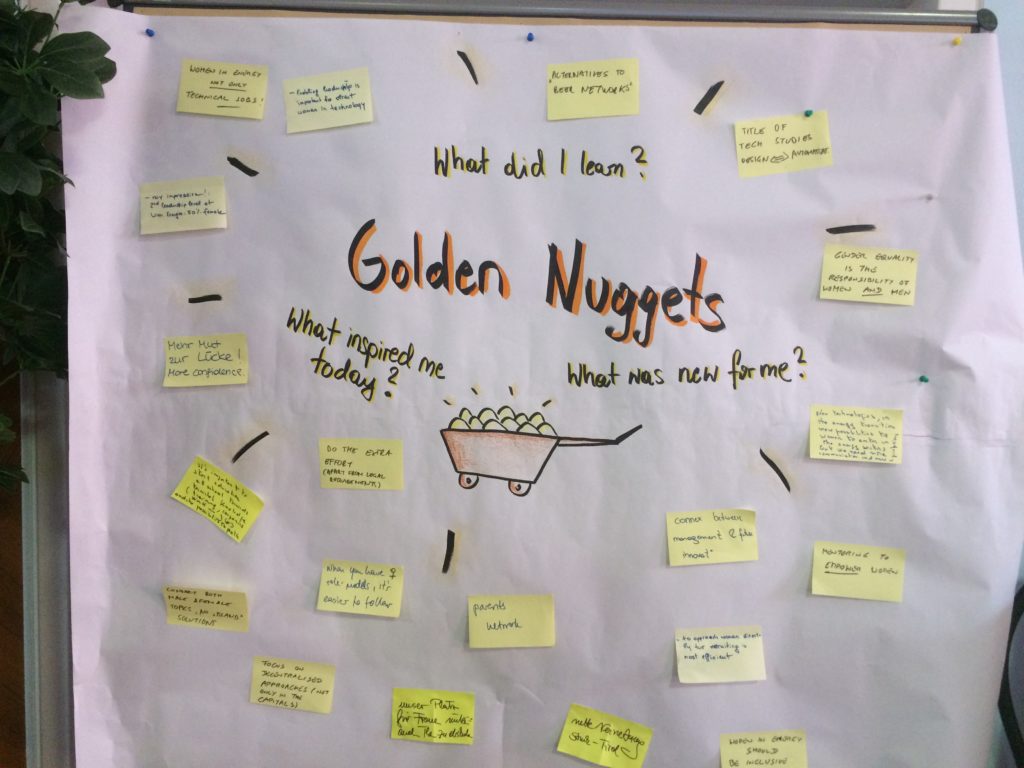
Keynotes
- Overview of the C3E TCP: Putting Ideas into Action
Annette Hollas, Chairwoman of the C3E TCP - Leading Change: The Relevance of Gender Diversity for Adaptability (Agility) and Innovation
Heike Mensi-Klarbach, Vienna University of Economics and Business

